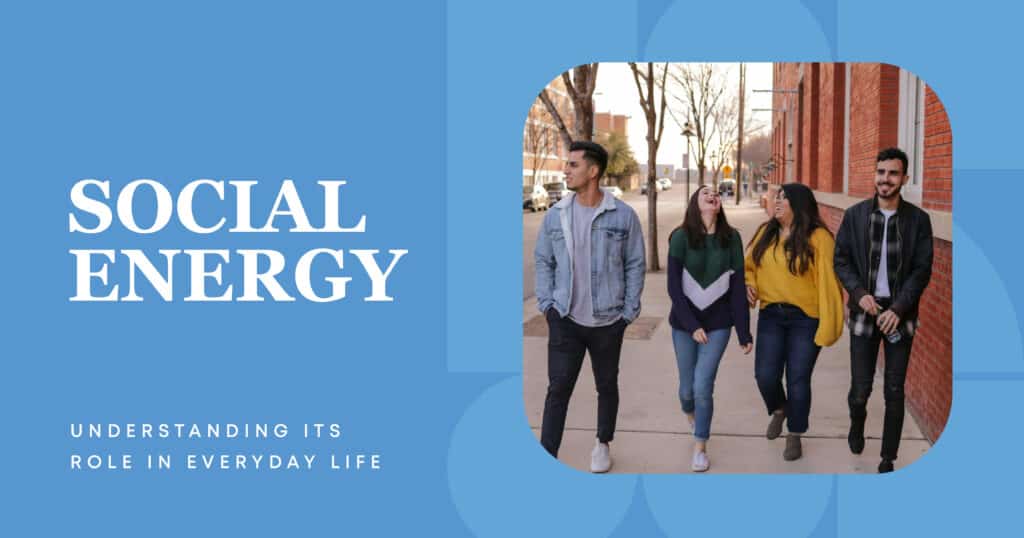It is common these days for individuals to talk about feeling drained after socializing but what exactly happens behind these feelings of being exhausted? The concept of social energy plays a crucial role in how we relate to other people. Understanding its dynamics can help one control their social life and maintain a balance of engaging in social interactions for recharging and improving mental health.
In any case, managing social energy is essential for your overall well-being. This post will cover social energy, how it affects mental health, and strategies to help recharge and maintain a healthy social balance.
The Multi-Faceted Nature of Social Battery Drain
Social energy is not all about physical tiredness. It is intricate and has emotional, psychological, and social components. Our ability to relate and maintain mental stamina varies according to personality types, situations, and how much we have engaged with others. Now, let us identify the salient features that drain social energy.
Emotional Exhaustion
Even the most simple and commonplace social events regularly become emotionally exhausting if an energy component is involved. What makes it all the worse is feeling like you always have to catch up or keep everything in sync with the emotions of a group.
It can be a lovely thing or a miserable function, such as your office networking lunch, a family reunion, or even just an evening spent with friends. All the time, this time away socializing often leaves you an empty shell.
Introverts may experience a more severe loss of social energy because they need more time to recover after such an encounter. At the same time, extroverts may get a different reaction because they thrive on social inclusion but, over time, fail to maintain that constant networking ability, wearing themselves out socially.
Introversion Vs. Extroversion
The most influential factor regarding social energy is whether an individual classifies them as introverted or extroverted. Introverts, in particular, perceive a drain of social energy more significantly than extroverts.
On the contrary, introverts replenish themselves by spending time alone, meaning they must withdraw from other people to replenish their energy levels. This gives them renewed or changed social energy.
Due to differences in energy needs, introverts may sometimes feel they have to socialize beyond their reach, which can cause them to experience exhaustion from all social interactions and drain their social energy.
Social Anxiety and Overstimulation
Social anxiety, as well as an overabundance of stimulation, also drain social energies. For example, a socially anxious person’s emotional and bodily reaction to social situations tends to be more extreme than that of others, even when everything is neutral or beneficial.
The person will then become fatigued from being subject to constant alarm, making even the most straightforward social interactions appear tiring. Overstimulation by noisy environments, crowds, or overly complicated social dynamics can cause exhaustion from socializing, where one feels unable to keep engagement without becoming mentally exhausted.
The Impact on Mental Health
How people manage their social transactions is critical in upholding their mental health and balance in their social lives.
Increased Stress and Anxiety
Pushing through people’s depleted social energy sets them up for higher stress and anxiety levels. Persistent social fatigue can activate the body’s stress response via an increase in cortisol, with all its corresponding consequences, including feelings of nervousness, anxiety, and irritability. Such stages of anxiety may run at serious levels, and one can be mentally fatigued and find it hard to concentrate or cope with daily chores.
Those who identify as introverts tend to feel the brunt of social exhaustion even more, as their wiring is such that they have a body that desires rest and alone time. Only they might feel it when they do not rest. That is when they start to feel more of an emotional and psychological disturbance than others.
Impaired Productivity
When you’re tired from social interaction, it can really blow your productivity. Focusing on anything becomes impossible, and you hardly do anything right at work or in your engagements.
Just like physical exertion, the brain also needs recovery time after social engagements to maintain good focus, problem-solving skills, and decision-making ability.
Those who suffer from chronic social energy depletion will be familiar with mental fog, with even the most straightforward of tasks looking impossibly daunting. The longer and harder you run your socials without proper recovery, the harder it gets to seem productive.
Strained Relationships
Social fatigue can also take a toll on relationships, personal and professional. Slowly but surely, the energy becomes drained, and there is an urge to retreat from those around, leading them into feelings of alienation or misunderstanding. Sometimes, individuals withdraw from loved ones or coworkers after exhaustion and are not up to it.
Knowing where your social limits lie is vital for healthy yet fulfilling relationships. When you find yourself low on social energy, you have the power to communicate about your needs instead of accidentally distorting them and causing unintentional distance.
Isolation and Loneliness
The depletion of social energy and the lack of engagement in any social activity can lead to isolation. For example, introverts go into their caves and recharge only to find it hard to re-establish connection with other people or, even worse, create a cycle of loneliness.
An extrovert will become alienated from their social circles when they do not maintain their usual high levels of interaction, resulting in quite a burnout. The key is to strike a balance, not to be overly isolated and feel lonely, and not to socialize too much so that one needs proper rest and yet feels exhausted.
Strategies for Recharging Your Social Energy
Several techniques can restore your social energy and bring a healthy balance to your social life. Here are some methods to recharge introvert energy and avoid social burnout.
Prioritize Alone Time
Social endurance can be rebuilt through time alone. In solitude, you will need to replenish your emotional and mental energy. Alone time is necessary for all introverted people to recharge after attending a social event. Activities such as reading, journaling, or wandering about in nature bring instant rejuvenation.
Extroverts, too, can benefit from a bit of downtime to reset their mental states and prepare for the next round of social interaction.
Set Boundaries
Establishing boundaries is crucial to shielding your social energy. Whenever you get into trouble due to too many social engagements, just say no, as it is perfectly okay to do so.
You must learn your limitations and recognize when to step back from being social. It should be cut short from an event or even turning down an invitation altogether, since learning to say no will help you avoid social exhaustion from becoming social burnout.
Balance Socializing and Recovery
Maintaining this balance between social and recovery time is crucial, preventing the depletion of social energy. This shall also include setting periods with sufficient time for rest before and after social events.
On the other hand, those with social anxieties may decide on smaller events or one-on-one interactions that are not stressful to the individual about overstimulation and exhaustion from social interaction.
Engage in Meaningful Connections
Instead of forcing yourself into social situations that zap your energy, seek connections that truly matter to you. Spend time with people you connect with at the core because that could be much more fulfilling and consuming. After a time, social fatigue dwindles when the person can share real experiences with another through purpose-driven interactions.
Social Energy on Mental Health and Relationships
Learn about social energy and its effect on your mental health, productivity, and relationships. To have an everyday social life, you should learn how to manage social endurance and identify symptoms of social burnout and social fatigue. You’ll have more fulfilling interactions, and your emotional well-being will be protected.
Call to Action:
Do you feel emotionally drained when you come out from socializing? Now is the time to regain control over your social energy usage. Energy is all yours. Make it clear for yourself and recover to balance social well-being and energy management. Call us today for further information about expert advice on all social things! Recharge today for a healthier tomorrow!
FAQs
- What is social energy, and why is it important?
This type of energy refers to all mental, spiritual, and bodily resources necessary for social engagement and interaction. Having social power means standing for balance, the most important of which is the healthy boundary between social and lust.
- How can I tell if I’m experiencing social fatigue?
Signs of social fatigue include feeling mentally exhausted after socializing, wanting to isolate yourself, or experiencing irritability and stress. If you notice these signs, it may be time to take a break and recharge.
- What are the effects of social burnout?
Social burnout can lead to increased anxiety, irritability, emotional exhaustion, and a lack of motivation to engage in social activities. It’s essential to recognize the signs early and prioritize recovery.
- How do introverts and extroverts differ in their experience of social energy?
Introverts typically feel more drained from socializing and need alone time to recharge, while extroverts gain social stamina from social interactions. Both groups can experience social energy depletion if they don’t manage their social engagements appropriately.
- How can I prevent social interaction exhaustion?
Set boundaries, prioritize recovery time, and engage in meaningful social connections to prevent social interaction exhaustion. Pacing social events and understanding your limits are essential for maintaining a healthy balance.




